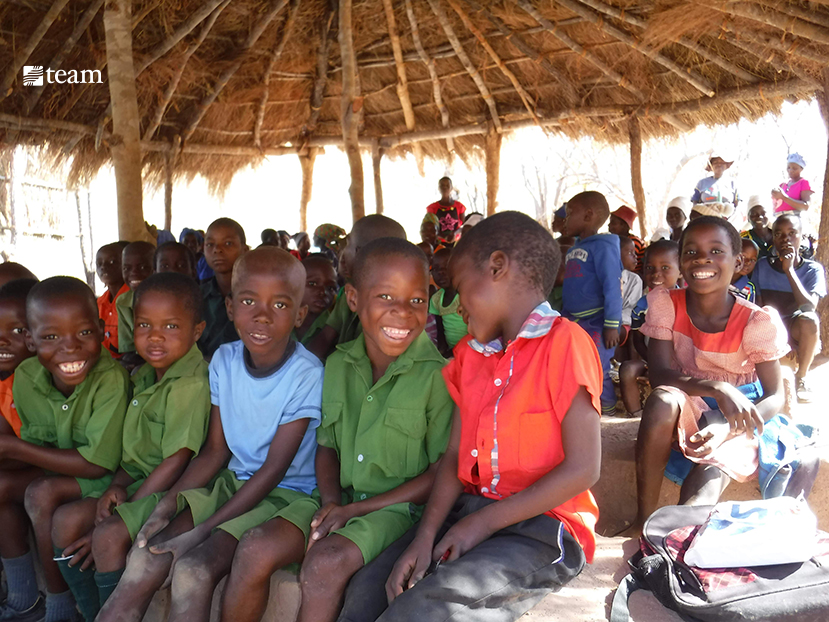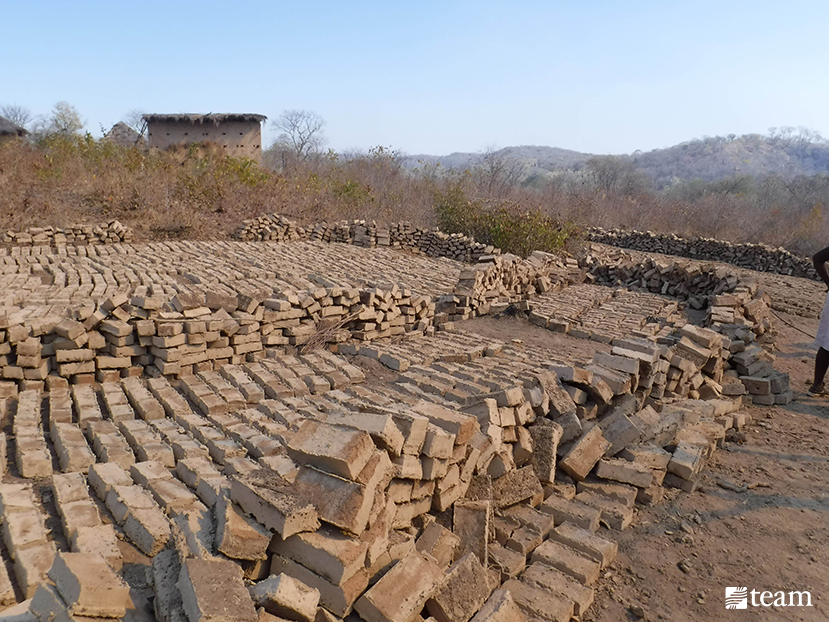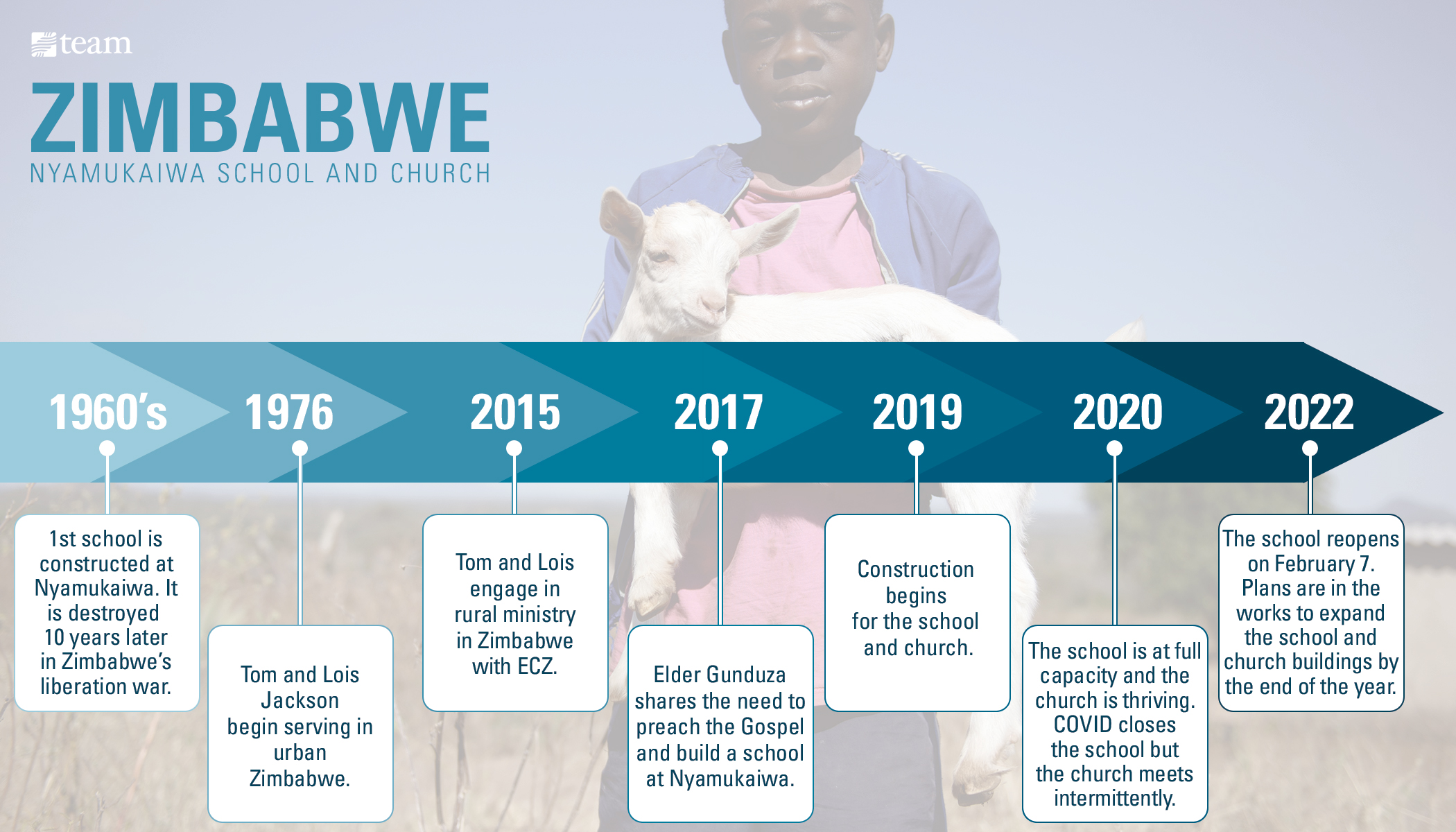
Ministry Updates
Patience Leads to Promise in Zimbabwe
March 11, 2022
by Suzanne Pearson

Waiting. Not many of us like it, and yet so often we’re stuck doing it. We wait for a package to arrive. We wait for an open dentist appointment. We wait for COVID restrictions to lift. We wait for an answer to prayer.
Tom and Lois Jackson, TEAM workers in Zimbabwe, have gotten really good at waiting. And after many years, God is rewarding their patience and endurance in amazing ways. But let’s start from the beginning…
“A Lesson in Patience”
Tom came to Africa in 1976 as a second-generation missionary, having grown up there. His parents, Russ and Marge Jackson, were among TEAM’s early pioneers in Zimbabwe. Tom and his wife Lois came to the south African country with a heart to serve in the rural areas, but Zimbabwe’s ongoing war of liberation kept the Jacksons and other global workers in the cities. God blessed the Jacksons’ ministry in these urban areas, but they never forgot the rural community. It wasn’t until just a few years ago that the Jacksons were able to fulfill their life-long calling. In answer to an invitation from the Evangelical Church of Zimbabwe (ECZ), Tom & Lois began to work in the remote Hurungwe District of northwestern Zimbabwe.
“It was only…in 2015 that we were able to engage with the rural communities,” says Tom. “It’s something we’ve always wanted to do and never been able to. And it’s been a real lesson in patience.”
Little did Tom and Lois know that they were about to enter a new season of waiting. In 2017, Mr. Gunduza, an elder of the church in Rengwe, approached them with an invitation to visit Nyamukaiwa, a remote area 15 kilometers away, deep in the mountains. He told them of the community’s longing for a school for their children. For the families of Nyamukaiwa, the only option for education was to make the two-hour walk across rugged terrain to the school at Rengwe – an impossible feat for children under the age of 10. Elder Gunduza reported that the community had the passion and the motivation to establish a school, they just needed supplies and a little extra help and support to make it happen. He also shared their readiness to receive the Gospel.

70,000 Hand-Made Bricks
In April 2019 Tom and Lois were finally able to visit Nyamukaiwa. Together with church leaders they traveled into the mountains and met with members of the community gathered on the hillside. There they learned something amazing – Tom’s parents had been part of TEAM’s outreach in the area in the 1950’s and 1960’s and had helped to build a small school there. Though the school had been destroyed in the 1970’s due to the war, the community members proudly showed the Jacksons the site which they had carefully preserved and guarded for nearly 60 years, waiting and hoping that the school might someday be rebuilt.
Tom and Lois could see the Lord’s hand in this and began at once to work with the community in making plans to build a structure that would serve not only as a school but also as a church where new believers could gather and grow in their faith. At this point, things began to happen very quickly…at least for a while. By May 2019, a temporary thatched-roof shelter known as an “elephant’s back” was constructed to house the church and school until a more permanent structure could be built.
The Jacksons and their church provided support and encouragement, but the people of Nyamukaiwa were anything but passive bystanders. Each family in the community was asked to mold 1,000 clay bricks for the construction of the school. Men, women and children worked together and produced over 70,000 bricks by hand! Pastor Joseph of the Rengwe church explains. “The community is a very passionate community. They are willing to give their sweat for the school to start.”

The brickfield represents the effort of dozens of local families playing their part to provide for the construction of the school.
Trusting God When He “Has Us on ‘Pause’”
By the fall of 2019, progress was abundant in Nyamukaiwa. “Each visit by now had become a celebration,” remembers Tom. “We [met] with the children, with the school and church leaders, and we [gathered] with new believers in small groups.” In January 2020, the school was serving 100 children ages 10 and under, and the community began the process of obtaining government inspections of the facility in order to receive public education funds. (In Zimbabwe, church-run schools are eligible for government funding for teachers’ wages and curriculum.) Everything was on track for a fully established, government-supported Christian school in Nyamukaiwa.
And then came COVID.
Between March 2020 and March 2022, Zimbabwe underwent four different lockdowns and the school remained closed for most of that time. The church continued to meet on and off as allowed by law, and the school leaders did their best to visit the children and their families since the area is too remote for any type of online learning.
The pandemic also delayed the inspections with the government’s Ministry of Education, leading to more lessons in patience for the Jacksons and the Nyamukaiwa people. Thankfully, the school reopened (hopefully for good!) in early February 2022 and the inspection process has resumed.
Despite so many setbacks and delays, the Nyamukaiwa community has remained steadfast. “The people are very resilient. They will find a way to survive. They’re really good at that because they have to do it under unbelievable circumstances, even without COVID” Tom shares. “They’re finding ways to survive the stress of it all.”
In fact, the Nyamukaiwa church often serves as an example of patience to the Jacksons themselves. Tom remarks that whenever God “has us on ‘pause’ the villagers seem to understand that.” “The believers who have come to know Christ are carrying on and doing well.”
A Promising Future for Nyumukaiwa
The trajectory ahead for the church and school in Nyukaiwa is a promising one. One of three government inspections has been carried out and the effects of the COVID pandemic appear to be largely fading into history. There are plans to expand the school building and create housing for teachers. The church is thriving as well. Twenty-six adults recently gave public testimony as they entered the waters of baptism in a nearby river. The Jacksons are also excited about a number of community development projects in the works including nutrition education, clean water initiatives and farming efficiency programs.
Lois is excited to think of what the future may hold for the children of Nyamukaiwa. “I often think, ‘Lord, why these remote people? What are you doing here?’” She believes God has special things in mind for these children.
Pastor Wonder of the Kapfunde church is thankful for the leadership skills that the children are learning, as well as their exposure to God’s Word through the church and school. He adds, “the [Nyamukaiwa] area will become a good example for other areas.”
In Nyamukaiwa, the teachers often lead the children in a song that asks, “Who has done these things?”
And the children sing in response, “NdiMwari wakanaka!” – “It is our good God!”
Related articles



